
A Guide Xiaomi Redmi 13C Wireless and Wired Screen Mirroring | Dr.fone

A Guide Xiaomi Redmi 13C Wireless and Wired Screen Mirroring
In simple words, screen mirroring is an approach to mirror the screens of two devices with one another. For instance, you can mirror your Android phone screen on the computer and the other way round. In this article, viewers will get to know how to mirror an Android screen on PC wirelessly or through a USB cable.
Screen Mirroring is quite useful in many ways. It allows you to display the screen of your Android phone, tablet, or PC on another device through a wired or wireless connection between both devices. In today’s life, not everyone is familiar with screen mirroring technology.
Part 1: What is Screen Mirroring?
Screen Mirroring is such technology that permits you to display your content from your device to another device. In the case of screen mirroring Xiaomi Redmi 13C PC, this could be done through both wireless and wired connections. At the same time, screen mirroring can be done when one device continuously sends the copy of its screen to another targeted device simultaneously.
In a meeting or presentation, screen mirroring plays an important role by facilitating team members to avoid complex setups and share their screens immediately. Moreover, screen mirroring supports the BYOD model, that is, “Bring Your Own Device.” The reason for supporting this model is to lower the cost and increase efficiency.
Part 2: Prerequisites for Android Screen Mirroring
To successfully cast Android screen to PC, the screen mirroring apps should work properly. For this purpose, it is recommended to do some settings on your Android device. The steps of settings for enabling both developer options and USB debugging are discussed below:
Enable Developer option
Step 1: Open the “Settings” app on your Android phone and choose “System” settings from the list. Now click on the “About Phone” option from the top of the screen.
Step 2: Now, you need to scroll down and click the “Build Number” option five times.
Step 3: Proceed back on the “System” settings, where you will find a “Developer” option present.
Enable USB Debugging
Step 1: First, open your Android phone “Settings” and go to “System” settings. Now click on the “Developers” option on the next screen.
Step 2: Now go down and turn on the “USB Debugging” option.
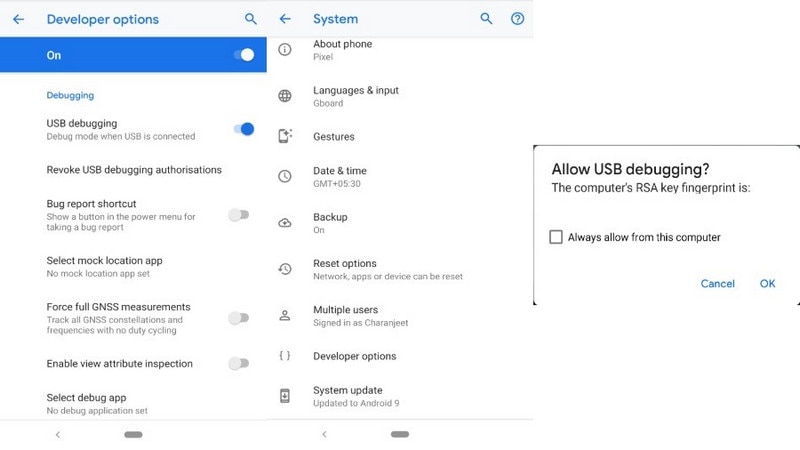
Part 4: Efficient and Fast Wireless Android Screen Mirroring Tool - MirrorGo
If you are looking for an advanced experience of mirroring your Android device with the PC, Wondershare Dr.Fone features an intelligent solution with efficiency. Whether you are presenting your business idea across a large screen or enjoying gaming with your friends, MirrorGo presents a quick and simple solution for mirroring your device with ease.
Wondershare Dr.Fone
Mirror your Xiaomi Redmi 13C deviceto your computer!
- Utilize the Game Keyboard for mapping the keys across your keyboard to an Android device.
- Easily manage and control your Android phone across the PC with the help of peripherals.
- MirrorGo enables an easy route of transferring files between the PC and Android device.
- Users can record their screens using the tools available on MirrorGo.
4,025,791 people have downloaded it
To understand the simple process of mirroring your Android screen across the PC, you need to follow the steps explained as follows:
Step 1: Download, Install and Launch
Users are requested to download the latest version of MirrorGo from their official website. Once installed, launch the application on the computer.
Step 2: Same Internet Connection
The user needs to ensure that the PC and Android device are connected across the same Wi-Fi connection. Once done, tap on the option of “Mirror Xiaomi Redmi 13C PC via Wi-Fi” on the lower bottom of the application’s interface.
Step 3: Attach through USB over Unsuccessful Connection
If the user fails to mirror the Xiaomi Redmi 13C device directly through Wi-Fi, they can connect their Android device with the PC via USB. Before that, it is important to turn on USB Debugging across the Android device for successful connection. Once the phone appears under “Select a device to connect,” you can remove the Android phone from the USB connection.
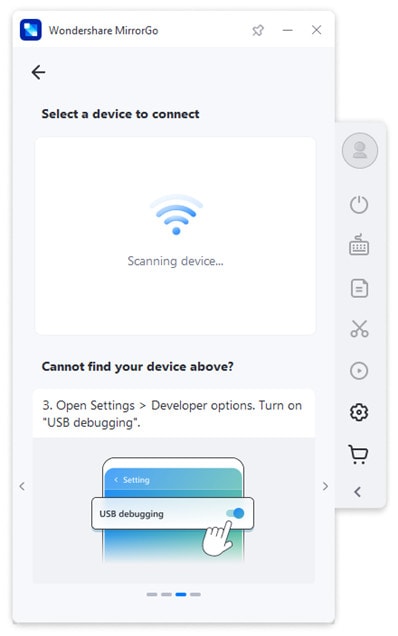
Step 4: Mirror and Control
Over selecting the Xiaomi Redmi 13C device for connection, a mirroring platform is established on the PC, and the user can now easily manage and control the Android screen across the PC.
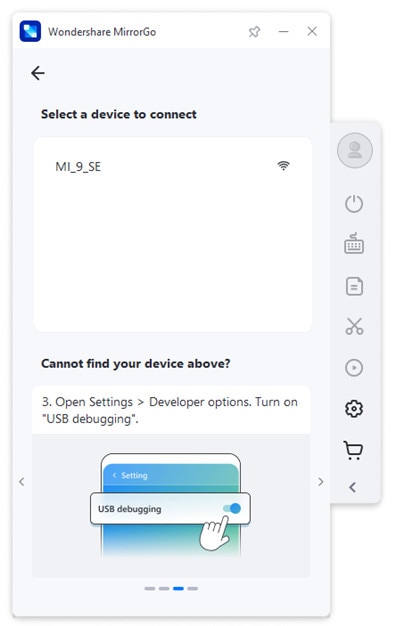
Part 3: Ways to Screen Mirror Android with USB Cable
In this part of the article, we will discuss the most efficient ways to mirror Android screen on PC via USB cable. These ways include efficient applications like Vysor and ApowerMirror. Both of these applications allow a wired USB cable connection between two devices for the purpose of screen mirroring.
3.1 Screen Mirror Android Using Vysor
Vysor is a substitute screen mirror application that helps you to control your Android device through a laptop or PC. By using Vysor, you can play games, project your content in meetings or presentations, share data, etc., through screen mirroring.
Well, the advantages of this screen mirroring application include a bigger screen size, a high-resolution mirror, and no compulsory requirement for root access. It also supports Windows, GNU/LINUX, and macOS. Some of the steps below will show you how to do screen mirroring Xiaomi Redmi 13C PC or laptop using Vysor.
Step 1: Simply download the Vysor application from your “Google Play Store” application on your Android device.
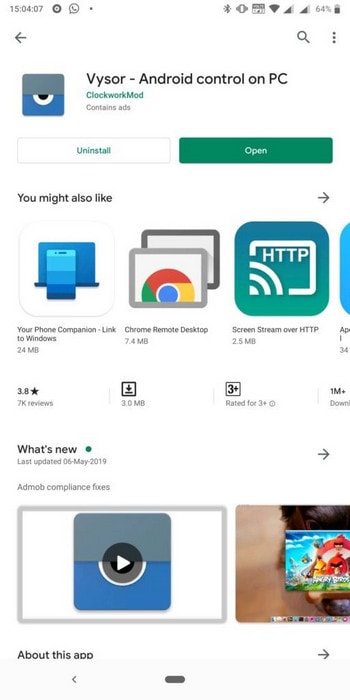
Step 2: Now, you need to download the Vysor application for your PC or laptop in order to access screen mirroring. Vysor is available for all Mac, Chrome, Windows, and Linux.
Step 3: After complete downloading, you can now connect your Android device with a PC using a USB cable or Micro-USB.
Step 4: After a successful connection, you can now open the “Vysor” app on your Android device to check the basic setup. During the basic setup procedure, you need to turn on the “USB debugging” option. You can find it in the “Developers Options” for the proper working of the Vysor app.
Step 5: You need to allow USB debugging for your PC after opening Vysor. You just have to select “Ok” from the box that appears on the screen of your Android device.
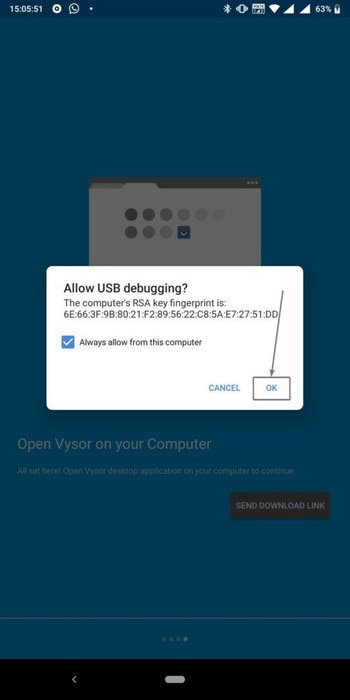
Step 6: You can now see your Android device name on your PC on the Vysor app. You just need to click on the “View” option to see your Android device.
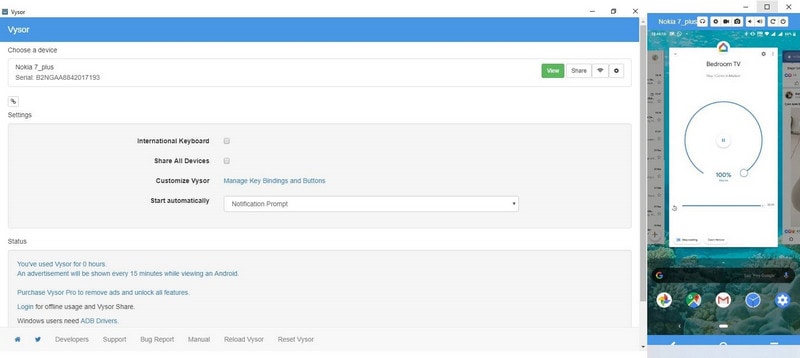
3.2 Control Android Screen Using ApowerMirror
ApowerMirror counts as one of the best screen mirroring applications among all the others. This app mainly applies the mainstream mirroring technology that is the reason for its ultimate mirroring experience. You are required to follow some steps that are listed below to cast Android screen to PC via ApowerMirror:
Step 1: Open your Android device “Settings” app and scroll down at the bottom of the page to see the settings of “Developer options.” Now further check the option of “USB debugging” and turn it on.
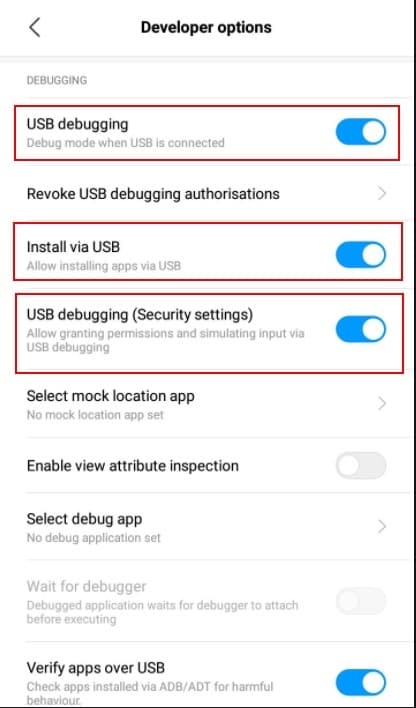
Step 2: In this step, you need to download ApowerMirror on your PC and install its setup. Now open the app from the Desktop.
Step 3: Now, use a USB cable to connect your Android device with your PC. After that, check the notification that appears on your Android device. Begin the mirroring process by clicking on the “Start Now” option in that notification.
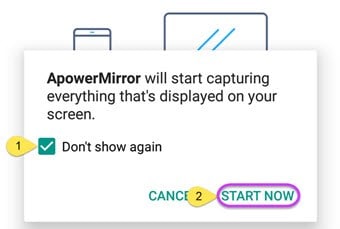
Step 4: At last, you can now entertain yourself on a much bigger screen by controlling your Android device.
Final Words
This article covers everything about screen mirroring and its working with the need to cast Android screen to PC. We have discussed the concept of screen mirroring both by wired or wireless connection. With the help of this article, you can now share your Android screen on a laptop or PC and can share data like documents, images, games, etc.
Furthermore, Wondershare introduces us to software like MirrorGo. It helps us to build a wireless connection between devices that we want to connect for screen mirroring purposes.
How To Do Xiaomi Redmi 13C Screen Sharing
Smartphones by Xiaomi Redmi 13C are rich in functionality and offer multiple benefits to users. However, do we ever wonder about using screen share in Xiaomi Redmi 13C ?
Whether there is a need to show unique clicks or videos on a bigger screen or want to stream amazing content on big TVs or computers, we must know how to screen share on a Xiaomi Redmi 13C phone. It becomes a lot easier to cater to a big audience with big screens.
So today, let us go through a detailed guide on **how to screen share in Xiaomi Redmi 13C ** to smart TVs and computers.
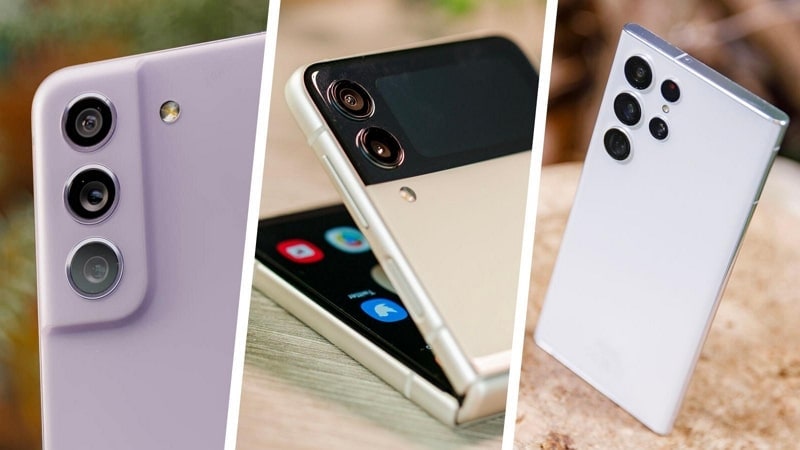
Part 1: Does Screen Sharing Use Bluetooth?
Bluetooth is not used for screen sharing as it does not have the bandwidth required to stream heavy media. Although it is commonly used for wireless data transfer, it is not suited for screen sharing. A major reason behind this is the slowness of Bluetooth, as its maximum speed for data sharing is up to 50MB/s. That makes it unreliable for screen sharing, making Wi-Fi the default choice.
Part 2: How to Share Screen From Xiaomi Redmi 13C Phone to Xiaomi TV Using Smart View?
Samsung Smart View is a feature in Xiaomi Redmi 13C devices that allows you to **screen share on Xiaomi Redmi 13C ** Smart TV. First introduced as an app, it is now an in-built feature of One UI.
When using the Smart View feature, you can share videos, photos, documents, games, and other things on your Xiaomi Redmi 13C device to your Xiaomi TV. The Smart View app allows you to use your Xiaomi Redmi 13C device as a virtual remote to control your Smart TV.
Requirements for Smart View App
The Xiaomi Redmi 13C Smart View app was introduced in 2011 to allow Xiaomi Redmi 13C users to share their device’s screen with Xiaomi TVs. Although it was discontinued on 05 October 2020 and replaced with Smart Things, its existing user base was not disturbed.
If they were already using the Smart View app or downloaded it before discontinuation, they can use it as long as they don’t uninstall it. These are the minimum requirements to use Smart View App on a device:
Android: It can be used on Android devices with Android OS 4.1 or above.
Samsung Smart TVs
All the Samsung Smart TVs after 2015 are compatible with Samsung Smart View. Below is the list of older Xiaomi TV models that offer Smart View compatibility for Samsung users:
- 2011 LED D7000 and above, PDP D8000 and above.
- 2012 LED ES7500 and above, PDP E8000 and above.
- 2013 LED F4500 and above (except F9000 and above), PDP F5500 and above.
- 2014 H4500, H5500 and above (except H6003/H6103/H6153/H6201/H6203).
- 2015 J4500, J5500 and above (except J6203).
- 2016 K4300, K5300 and above.
Samsung Devices with Smart View Feature
With the introduction of One UI in Samsung devices, the Smart View was added as an in-built feature. All Samsung devices launched with One UI can use the Smart View feature to share their device’s screen with Xiaomi TV. The Samsung devices that support the Smart View feature include Galaxy S Series, Galaxy Z Series, Galaxy Note Series, Galaxy A Series, Galaxy M Series, and Galaxy F Series.
Steps for Using Smart View to Share Screen
Before explaining the steps, it is important to state that available screens and settings may change depending on your device, Smart TV, or service provider. The Smart View feature is also unavailable on all Samsung devices, and you might need to use the Smart View or Smart Things app.
Ensure that your Samsung device and Smart TV are connected to the same network, and follow these steps for screen sharing:
Step 1: After connecting your device and Smart TV to the same Wi-Fi network, open the “Quick Panel” on your Samsung device. Here, press and enable “Smart View.”
Step 2: Select your Xiaomi TV among the available devices when Smart View is enabled. Once connected, choose the content you want to share on the TV screen.
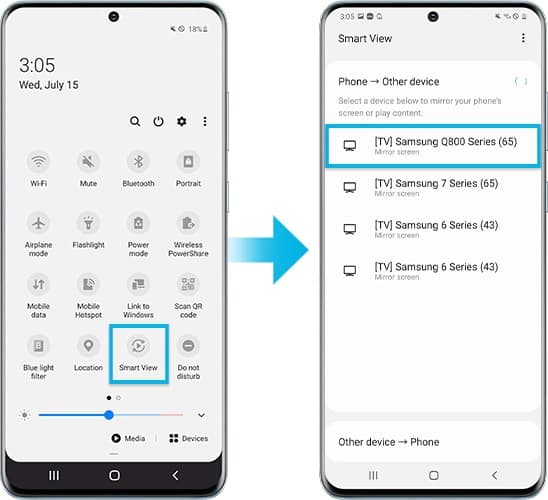
Step 3: You can select your desired content through options like My Photos, My Videos, or My Music. When the desired content is selected, you can enjoy it on a bigger screen.
Part 3: How to Share Screen From Samsung Phones to Other Smart TVs?
If your Smart TV is of another brand instead of Samsung, it is still possible to share the Samsung devices screen with your TV. Multiple tools are available online that can be used to share your Samsung device with your TV, depending on the TV brand. You can use tools like AllShare Cast, Chromecast, or Amazon Firestick.
Like Smart View, all wireless screen share tools require your Samsung device and Smart TV to be connected to the same network. Once connected, you will need to plug the respective tool’s adapter into your Smart TV, and you should be able to share your Samsung device. If your Smart TV doesn’t support Miracast, you can use AllShare Cast Wireless Hub for screen sharing.
Part 4. How to Share Screen From Samsung Phone to Computer Using Dr.Fone Air?
After learning about screen sharing to TVs, it is about sharing a Samsung phone screen with a computer. There is no need to worry, as we have a perfect wireless solution.
Dr.Fone Air is a powerful online screen mirror solution allowing screen sharing in Samsung to any computer. It can quickly mirror a Samsung phone to any web browser using a Wi-Fi connection only. Further, it is easy to download Wondershare Dr.Fone Air from its official website.
Key Features of Dr.Fone Air
- It provides great cross-platform support for screen sharing and casting. You can easily share screens from Android or iOS to Windows or Mac.
- You don’t need to give any unnecessary permissions when using Dr.Fone Air. It also doesn’t require Bluetooth or NFC for screen sharing.
- Your data during screen sharing remain protected as it doesn’t require downloading or uploading your content.
Steps of Using Dr.Fone Air for Screen Sharing
Sharing your Samsung phone screen with your Xiaomi TV using Dr.Fone Air is a simple and quick process. Your Samsung device and Xiaomi TV needs to be connected to the same Wi-Fi network. Once they are connected, follow these steps for screen sharing:
- Downloading and launching Dr.Fone Air: The first step is to download and launch Dr.Fone Air from the official website. The next step is to connect the Samsung phone and computer with the same Wi-Fi connection.
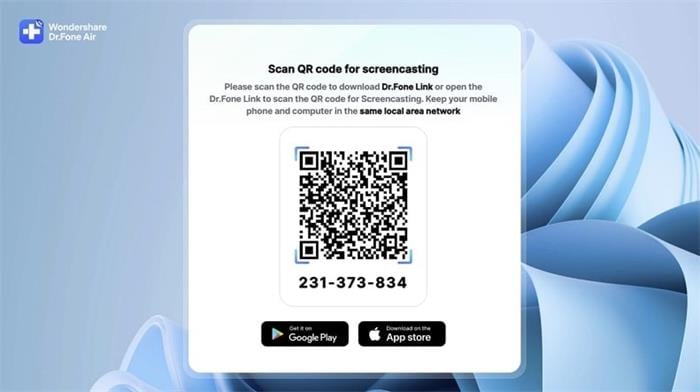
- Using QR or Cast code: The second step is to use the QR or Cast code as shown on the screen of the browser.
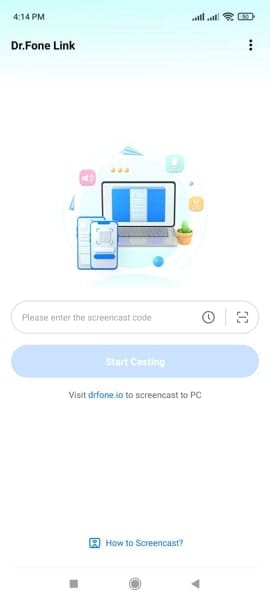
- Mirroring Samsung phone to computer: The Samsung phone will be automatically mirrored to the computer on successful scanning or code entering.

Conclusion
Hope everything is clear to our readers about the different methods to share the screen in Samsung. The detailed steps for screen sharing on Samsung phones to Xiaomi TVs and other Smart TVs make it easy for users to optimize the benefits of the big screen.
Make sure to check out is using Dr.Fone Air for sharing screens from Samsung phones to computers directly. It is a reliable, secure, and quick method to wirelessly mirror any mobile phone screen to any web browser.
Best 3 Xiaomi Redmi 13C Emulator for Mac to Run Your Wanted Android Apps
Mac OS, on the other hand, is a wonderful operating system used by Apple Inc. on it’s Mac PC and MacBook. It has a marvelous user interface and great features. It will be fantastic if we were able to use Android apps on Mac PC. Luckily, it is possible by using an emulator. In this article, we will learn about the five best Android Emulators for Mac.
Part 1. Why You Would Run Android Apps on Mac
- • To run around 1.2 million apps on Mac from Google Play Store.
- • To play tons of Android games on larger screen.
- • People, who spend a good amount of time in front of desktop, will find it more convenient if they were able to use apps like WeChat, WhatsApp, Viber, Line etc. on their Mac.
- • App developer can test their apps on the desktop before sending it to the Google Play Store for user reviewing.
- • Some Emulator supports battery and GPS widgets. So, developers can test their apps based on the battery performance and can also test how their apps will work on different geographical locations.
Part 2. Top 3 Android Emulator for Mac
1. BlueStacks
BlueStacks App Player is probably the most popular emulator for running Android apps on Mac. It is available for both Mac and Windows. It creates a virtual copy of Android OS apps on the guest OS. It uses the unique “LayerCake” technology that allows you to run android apps on your PC without any external Virtual Desktop Application. Once install user can enjoy Android games and apps such as News Feeds, Social Network on a large screen.
BlueStacks maintain an internal search manager that allows any apk, the package file format that is used to distribute and install application and middleware on any Android device, to install within it. It can be
Advantage
- • .apk files can be installed into BlueStacks from Mac simply by double clicking.
- • It can also sync between the apps on Mac and the android phone or tablet by installing BlueStacks Cloud Connect app on Android Device.
- • Apps can be launched directly from Mac dashboard.
- • No need to configure additional Internet connection as it automatically gets the Internet connection of host computer.
- • BlueStacks App Player is available for both Windows and Mac.
Disadvantage
- When running complex graphic apps it fails to respond to the input in a timely fashion.
- It does not provide any mechanism to uninstall cleanly from the host computer.
Download
- • It can be downloaded from the official website of BlueStacks . It is absolutely free.
How to use
Download BlueStacks for Mac OS X from the official website of BlueStacks and install it like any other software on your PC. Once installed, it will boot up to its Home Screen. From there you can find the installed apps, find new apps in the “Top Charts”, search apps, play games and change settings. Mouse will be the basic touch controller. To access Google Play you will have to associate a Google Account with BlueStacks.
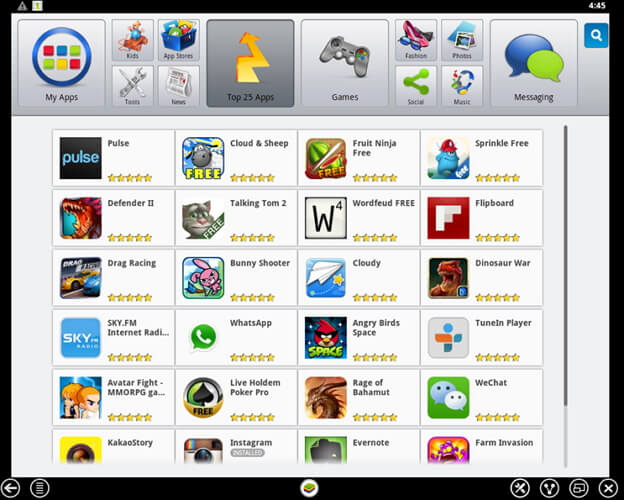
2. Genymotion
Genymotion is a fast and wonderful third party emulator that can be used to create a virtual environment for Android. It is the fastest Android emulator on the earth. It can be used to develop, test and run Android apps on Mac PC. It is available for Windows, Mac, and Linux machine. It is easy to install and can create a customized android device. You can start multiple virtual devices at the same time. It has the pixel perfect functionality so you can be precise to your UI development. By using the OpenGL acceleration it can achieve the best 3D performance. It directly commands the virtual devices sensors with Genymotion sensors. It is evolution of the Android open source project and already trusted by about 300,000 developers around the globe.
Advantage
- • Best 3D performance is achieved through OpenGL acceleration.
- • Support full screen option.
- • Can start multiple virtual devices at the same time.
- • Fully compatible with ADB.
- • Available for Mac, Windows and Linux machine.
Disadvantage
- • Require virtual Box to run Genymotion.
- • Cannot deploy Android machine offline.
Download
- Genymotion can be downloaded from the official website of Genymotion. The latest version of Genymotion is 2.2.2. You have to choose a package that meets your requirements.
How to use
- 1. Download Genymotion. You have to create an account to download it.
- 2. Open the .dmg installer. It will also install Oracle VM Virtual Box on your computer.
- 3. Move the Genymotion and Genymotion Shell to application directory.
- 4. Click the icon from Application directory and the following window will appear.
- 5. To add virtual device click on the add button.
- 6. Click on the connect button.
- 7. Enter your user name and password to connect to the Genymotion Cloud and click on the connect button. After connecting with the Genymotion cloud the following screen will appear.
- 8. Select a virtual machine and click on Next.
- 9. Give a name for the Virtual machine like below and click on Next.
- 10. Your virtual device will be now be downloaded and deployed. Click on the Finish button after successful deployment of your virtual machine.
- 11. Click on the Play button to start the new virtual machine and enjoy.
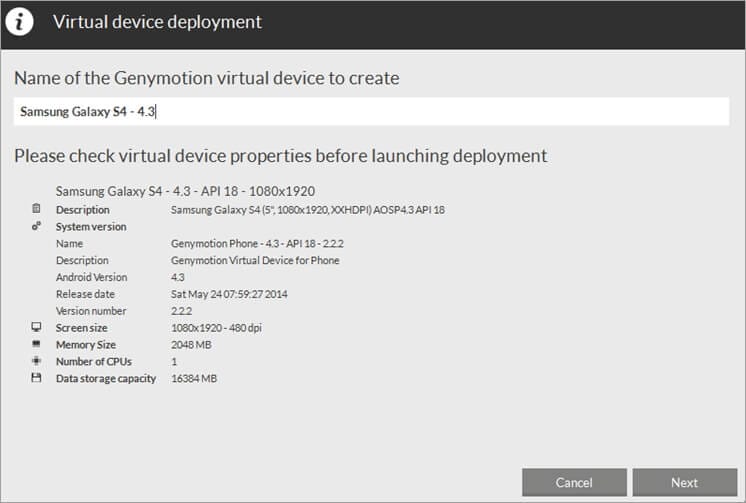
3. Andy
Andy is an open source emulator that allows developers and users to enjoy more robust apps, to experience them in multiple device environments, and to stop being constraint by the limits of device storage, screen size or separate OS. User can update their Android through Andy. It provides seamless sync between desktop and mobile device. User can use their phone as joystick while playing games.
Advantage
- • It provides a seamless sync between desktop and mobile device.
- • Enable Android OS update.
- • Enable app download from any desktop browser to Andy OS.
- • Phones can be used as joystick while playing games.
- • Unlimited storage expansion.
Disadvantage
- • Increase CPU usage.
- • Consumes a lot of physical memory.
Download
- • You can download Andy from <www.andyroid.net>.
How to Use
- 1. Download and install Andy.
- 2. Launch Andy. It will take about a minute to boot and then it should see a welcome screen.
- 3. Sign into your Google Account and complete the rest of the setup screen. You will be asked to provide your Google Account Information to 1ClickSync, the app that let’s you sync between Andy and the mobile device

Also read:
- [New] In 2024, Cross-Platform Sharing Tweeting Videos Across FB
- 2024 Approved Precise Mac Photo Tips Mastering Five Quick and Effective Methods
- 3 Facts You Need to Know about Screen Mirroring Vivo S17 | Dr.fone
- Full Guide on Mirroring Your Oppo A1 5G to Your PC/Mac | Dr.fone
- How to Mirror Your Honor Magic 5 Screen to PC with Chromecast | Dr.fone
- In 2024, 8 Best Apps for Screen Mirroring Xiaomi Redmi Note 12R PC | Dr.fone
- In 2024, A Step-by-Step Guide on Using ADB and Fastboot to Remove FRP Lock from your Honor
- In 2024, How to Mirror Apple iPhone 14 Pro to PC via USB? | Dr.fone
- In 2024, Recommended Best Applications for Mirroring Your Vivo X Flip Screen | Dr.fone
- Master the Art of Photo Display with Best Frames
- Maximize Your Screen Recording Experience with W8 Tools
- Recommended Best Applications for Mirroring Your Vivo Y200e 5G Screen | Dr.fone
- Ultimate Mac-Compatible iPhone Data Rescue Tool: Restore Lost Photos, Videos, and Contact Details
- Unlock PC Gaming on Steam Deck: Remote Play Essentials
- Untangling Non-Responsiveness in Canon Print
- What to Know About the Upcoming Google Pixel Fold Version 2: Estimated Price Points, Release Forecast and Speculative Tech Facts
- Title: A Guide Xiaomi Redmi 13C Wireless and Wired Screen Mirroring | Dr.fone
- Author: Seraphina
- Created at : 2025-02-09 17:16:03
- Updated at : 2025-02-12 03:01:32
- Link: https://screen-mirror.techidaily.com/a-guide-xiaomi-redmi-13c-wireless-and-wired-screen-mirroring-drfone-by-drfone-android/
- License: This work is licensed under CC BY-NC-SA 4.0.
